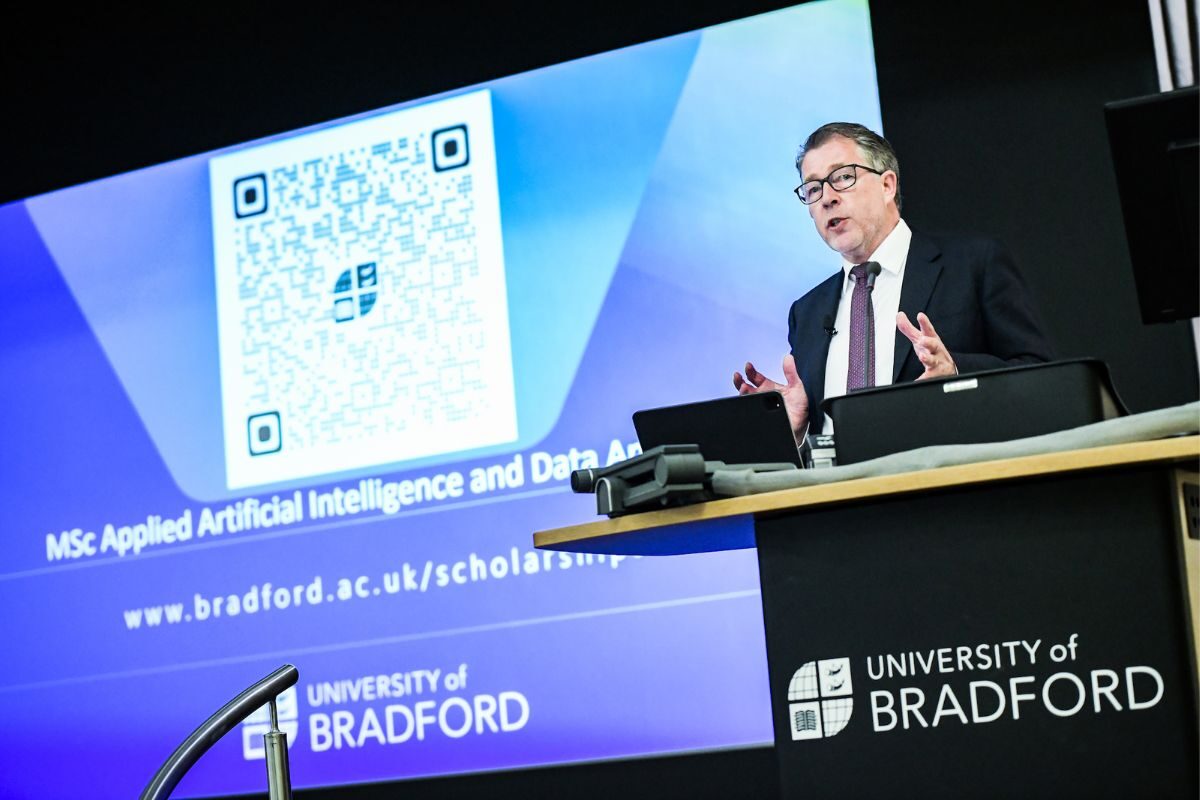‘Human qualities are essential for managing risk’ says senior banker at University of Bradford event for AI talent

A former chief risk officer at one of the world’s biggest banks has highlighted the enduring importance of human qualities in helping to manage risk in a fast-changing and increasingly technology-driven world.
Speaking at the University of Bradford, Mark Thundercliffe told an audience of more than 100 applied AI and data analytics students they have “a role and a responsibility to make sure they are knowledgeable, reliable and using their skills for good purposes” as they embark on careers in technology.
“If you do that, you are solving huge problems the world is facing into,” he said.
Mr Thundercliffe was a chief risk officer at HSBC and held senior positions at Citibank and Virgin Money. The Yorkshireman is a senior banking advisor to SAS, the leader in analytics and artificial intelligence, for Northern Europe.
He was keynote speaker at the Talent Connect event held at the University of Bradford to match AI students with SAS customers, including the Department for Work and Pensions.
Introducing the event, Professor Amir Sharif, Dean of the Faculty of Management, Law and Social Sciences, said the University of Bradford has established itself as the leading provider of AI skills workforce development in the UK.
He added: “Our programme will continue to grow and go from strength to strength. We are giving students the opportunity to develop key skills for the future.”
SAS is maintaining its annual £1.25 million contribution-in-kind to support the university’s Applied AI and Data Analytics course, the biggest programme for AI graduates in the UK.
The conversion course is designed to teach students from non-technical backgrounds to apply the technology to define and solve problems with the aim of improving business and society in general.
Students and researchers will have access to SAS Viya, a leading platform for artificial intelligence and machine learning, along with extensive digital learning resources, skills certification, secondments and internships.
The university launched the programme in 2020 in response to widespread industry skills shortages. Research published last year by SAS revealed that more than six in ten businesses across the UK and Ireland do not have employees with the AI skills they need.
The Applied AI and Data Analytics programme has attracted £1.4 million in government funding and an additional £2.8 million in industry matched contributions, of which SAS is the largest provider.
The support will help the university to increase the number of scholarships available to students from disadvantaged backgrounds who are underrepresented in the data science professions.
Professor Zahir Irani, Deputy Vice-Chancellor, said:
“We’re delighted to be strengthening our partnership with SAS, which will help us to develop the next generation of AI talent to help address the challenges faced by enterprises and governments.
“The University of Bradford is the biggest single UK provider of graduates with AI skills and has a long and successful track record of working with industry partners through our triple crown-accredited School of Management.
“It was great to welcome Mark Thundercliffe and hear his message about the enduring importance of human qualities in helping to manage risk in our fast-changing world. Our course is uniquely focused on defining and solving problems instead of simply using mathematical optmisation to improve the functioning of complex algorithms.”
Geoffrey Taylor, Global Academic Programme Manager at SAS UK & Ireland, said:
“Demand for data science talent has never been higher. The University of Bradford’s MSc programme for applied AI and Data Analytics is a remarkable success and is an important talent pool for our blue-chip customers and their requirements.”
SAS also piloted SAS STEP with the University of Bradford, a free online learning programme to equip jobseekers with data and analytics skills for in-demand jobs. It has since been rolled out across the UK and Ireland.











Responses